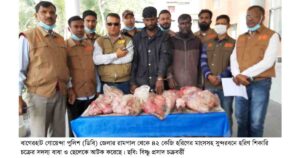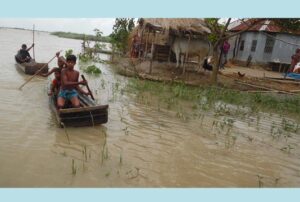Hundreds of minority people have started enjoying arsenic-free safe drinking water in Kalna village under Tanore Upazila of the district for the first time as two hand- driven tube-wells have been set up there around one month ago.After facing acute water crisis, inhabitants of the village are now happy with the water facilities.The area is dried so ensuring cent percent safe drinking water supplies and sanitation to the ethnic communities is a big challenge, said Akheruzzaman Hannan, chairman of Talanda union parishad.He viewed that the installed two tube-wells and 10 pit latrines were not sufficient for the 155 households of around 600 people.In an effort to ensure the rights of safe water and sanitation to some extent, a four-year project titled “Enhancing Governance and Capacity of Service Providers and Civil Society in Water Supply and Sanitation Sector” is being implemented there since last year.Rajshahi Social Development Programme and NGO Forum for Public Health are jointly implementing the project with financial support of European Union.As there was no tube-well and sanitary larine, the households had to use pond water for drinking, washing and cleaning purposes and to excrete in the open field polluting the environment, Sundari Hembrom, 30, a member of the community, said.She said, “None of our people have financial capacity to install any tube-well or latrine personally”.RSDP has installed eight deep set pumps and constructed 10 pit latrines, a community latrine and a school latrine in Talanda and Kamargaon unions in the upazila. But still the people need more to meet up their demands of water and sanitation.
“The tube-wells are not the final solution in the wake of an abnormal lowering of groundwater table. At least two women’s force is needed to extract water to fill only one pitcher,” said Sundari.Being a remote village Kalna remained neglected and its population had been suffering from an acute crisis of pure drinking water.Selim Jahangir, Executive Director of RSDP, said they are implementing the project through 18 village development committees in Tanore and Kamargaon unions.Each tube-well installation requires Tk 40,000. In 1991, the water layer in the area was within 40 feet which has now gone beyond 140 feet. “Many of the tube-wells become inoperative during the dry seasons”.Sabit Jahan Sisir, programme facilitator of NGO Forum for Public Health, said more GO-NGO interventions are needed to bring the drought-affected ethnic communities in the high Barind tract comprising Rajshahi, Chapainawabganj and Naogaon districts under safe drinking water and sanitation.“They have rights to water and sanitation facilities. There are around 40,000 ethnic people only in Tanore upazila, who live in more than 80 communities in a scattered way,” said Mazeda Yeasmin, Upazila Nirbahi Officer. More or less similar scene prevails in all the communities, she added.Bahar Uddin Mridha, Executive Engineer of Department of Public Health Engineering, said, during the dry season, they cannot extract underground water through tubewells as the water layer goes down abnormally.Apart from this, the changed climatic condition has been posing a serious threat to the overall public health in the vast Barind tract especially Tanore and Godagari Upazilas of the district.“The fight against water scarcity and unhygienic situation is very tough. Coordinated efforts of different government and non-government organisations are essential to stem the crises,” she said.BSS, Rajshahi




